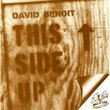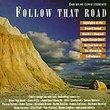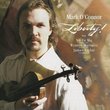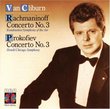| All Artists: Elliott Carter, Pacifica Quartet Title: Carter: String Quartets Nos. 1 & 5 Members Wishing: 1 Total Copies: 0 Label: Naxos American Classics Original Release Date: 1/1/2008 Re-Release Date: 1/29/2008 Genre: Classical Styles: Chamber Music, Historical Periods, Classical (c.1770-1830) Number of Discs: 1 SwapaCD Credits: 1 UPC: 636943936221 |
Search - Elliott Carter, Pacifica Quartet :: Carter: String Quartets Nos. 1 & 5
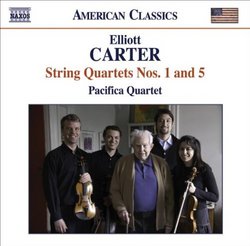 | Elliott Carter, Pacifica Quartet Carter: String Quartets Nos. 1 & 5 Genre: Classical
2009 GRAMMY Award winner: Best Chamber Music Performance |
Larger Image |
CD DetailsSynopsis
Album Description 2009 GRAMMY Award winner: Best Chamber Music Performance Similar CDsSimilarly Requested CDs
|
CD ReviewsNaxos cashes in on the Carter craze Joe Barron | Philadelphia, Pennsylvania United States | 01/31/2008 (4 out of 5 stars) "It isn't necessary anymore to mention in every review that Elliott Carter will turn 100 in December 2008 and that at 99 he is still vital and composing, but it's just too impressive and heartening a fact to ignore. As a centenary offering, Naxos is releasing Carter's five string quartets in two volumes, performed by the Pacifica Quartet. This first disk contains the composer's first and, to date, his last works in the genre. The First, from 1951, is generally considered Carter's breakthrough into his signature brand of modernism -- a sweeping, forty-minute tour de force, in three big sections, teeming with all the technical and expressive ideas that had been lurking in his subconscious. The Pacifica, a young group, plays with energy and a high polish that emphasizes beauty over drama, and a blending rather than a confrontation of instruments. The rich sound is particularly impressive in the opening Maestoso. The players seem to lose focus in the transition between the Adagio and the Variations, but they recover in the finale, which, in their hands, is luminous, rather than driving. The work is multifaceted and deep enough to support the approach. The Pacifica reveals a side to Carter that, in the face of all the clichés about his spiky modernism, has been unfairly overlooked. The Fifth Quartet, which appeared forty-four years after the First, inhabits much the same sound world, but on a more concentrated, intimate scale. The piece is half the length of the First Quartet, yet it has twice as many tracks, each between one and three minutes long. The introduction is followed by six movements, each with a single, sustained character, separated by five interludes that mix together fragments of the extended music. Carter has compared the piece to a chamber rehearsal, in which the musicians comment on what they've just played or try out bits of what they are going to play later. The piece is also self-referential, recapping textures, techniques and moods, though not literal passages, from his four earlier quartets. The pizzicato Capriccioso that ends the work recalls the Third Quartet, the Presto scorrevole refers directly to the Allegro scorrevole of the First Quartet, and some the solo passages in the interludes remind me of the solos in the Second. Carter says he wrote the Fifth Quartet as a "farewell to the previous four and an exploration of a new vision," though we may still hope it is not a farewell to the form itself. The notes, by Bayan Northcott, say the music has a playful, divertimento-like character, but I must add this lightness does not rule out many passages of great power and anguished lyricism. The Pacifica gives a crisp reading that benefits from a spacious reverb. Brandon Vamos' incisive, rich-toned cello playing in the piece deserves special mention. A second Naxos disk, containing the Pacifica's recordings of the Second, Third and Fourth quartets, is scheduled for release in summer of 2008. When it arrives, we shall at last have a unified cycle of Carter's greatest chamber music, played, moreover, by enthusiastic young champions who understand and love it. That's a birthday present any hundred-year-old man should be happy to receive. " Elliott Carter on Naxos Robin Friedman | Washington, D.C. United States | 02/13/2008 (5 out of 5 stars) "This year includes the 100th birthday of the great American composer Elliott Carter (b. 1908). To celebrate the occasion, Naxos is releasing two CDs consisting of Carter's five string quartets, the first and the fifth of which are included on this disk. The Pacifica Quartet, a group of young musicians from California, perform these difficult works with passion and clarity. The Pacifica Quartet specializes in contemporary music, especially the works of Elliott Carter. Carter began the serious study of music as an adolescent and his efforts were encouraged by Charles Ives. In the 1940s, some of his music (including his first symphony available on Naxos in a recording by Kenneth Schermerhorn) is reminiscent of the Americana music of Aaron Copland, but Carter soon developed his own unmistakably modernist musical voice. (The Schermerhorn CD also includes the difficult Carter piano concerto.) The five string quartets, written over a period of 45 years give an outstanding overview of this modernist American composer. Although Carter's quartets bristle with difficulties for the performer and listener, I was struck by the accessibility and the visceral, emotional character of these quartets when I first listened through them. There is a tendency to over-intellectualize modern music and Carter's music in particular. But this is music which, when given the chance, speaks to the heart first, before it speaks to the mind, and which mirrors the complexity of both specifically modern experience and of the human condition. Carter's first string quartet, composed in 1950-51, was among his first modernist efforts. It is a lengthy, difficult work in five movement which are played without a break between them. The work is densely scored, with bristling harmonies and marked shifts in tempos and rhythm. The texture of the work also is full of shifts, from passages for solo instruments, to sections for impassioned ensemble playing, to moments when the quartet breaks into two groups (the cello and the viola playing against the two violins in the fourth movement), and to long pizzicato passages. Yet the work makes a cohesive, unified whole. I was fascinated by the transitions between movements in this work, and in the fifth quartet, as musical passages of widely different characters flow seamlessly together. Thus the work opens with a lengthy, emotional solo for cello which, after elaboration by the other insturments, shifts imperceptibly into the following scherzo. The adagio consists, as I mentioned, of a section for cello and viola juxtaposed against a figure for the two violins, and these two competing voices are ultimately unified into a taut section which becomes the basis for the long variation movement which concludes the work. The variations work up to a climax (and the thematic material remains identifiable throughout) and then the bubble bursts as Carter closes the work with a solo for the violin, quiet and high in the instrument's register. The fifth quartet, composed in 1995, has a lighter texture. It consists of 12 short movements played without pause and lasts only about 21 minutes. In this work, short sections of a distinct musical character are juxtaposed against an opening introduction and against sections marked "interlude". There are two slow movements, the fourth and the tenth, three scherzo-like movements, the second, sixth, and eighth, and a concluding pizzacato movement, with some odd sounds from the instruments, marked capriccioso. The fascination of the work lies in the interrelationship of these sections with the interludes, as Carter joins the movements together by weaving moments from the surrounding short pieces into the interludes -- which have a deceptively sketchy style. Thus, interlude II, takes up the slow, expressive character of the preceding Lento, but turns at the last moment to transition to the following presto. Interlude V, in contrast, only makes a gesture towards the previous adagio before it sets the stage for the final Capriccioso. I listened several times to this work straight through and, on my last hearing, watched the second timer on my CD so that I could see directly how the movements flowed together. Carter's music will not appeal to those listeners with exclusively conservative musical tastes. But listeners with a background in classical music who wish to be adventurous will respond to the music of Elliott Carter. Naxos is doing a great service in making Carter's music available to a wide audience at a budget price. Robin Friedman" Superlative Stephen C. Browne | 05/26/2008 (5 out of 5 stars) "This recording is every bit the equal of the earlier Julliard and Arditti discs. Its probably fair to say that Pacifica strikes a midpoint between the coolness of the Arditti recordings and the almost romantic warmth of Julliard. This music benefits from multiple interpetations and viewpoints so it is difficult to speak of one approach being definitive or markedly superior to another when musicians the quality of the Pacifica, Arditti and Julliard quartets are involved. The sound quality here is excellent and given that the Julliard recording is currently out of print, I would recommend this as the first choice for anyone heretofore unfamiliar with Carter's quartets."
|

 Track Listings (17) - Disc #1
Track Listings (17) - Disc #1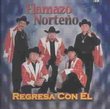
![Organ in Splendour & Majesty [Germany]](https://nationalbookswap.com/cd//m/45/9245/6149245.jpg)



